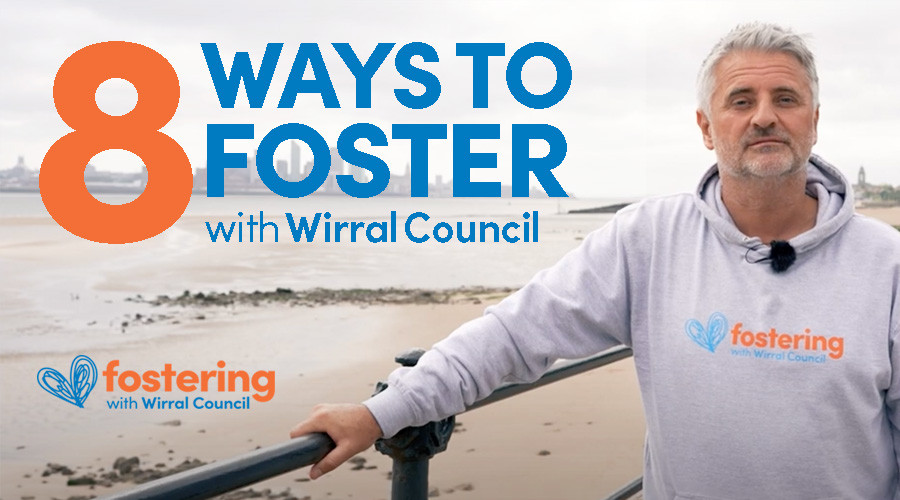8 ways to change young lives - which journey suits you?
Neil is a recruitment support worker in the Wirral fostering team. Here he talks about the different types of fostering placements that could suit you…
Short-Term
Being a short-term foster carer can suit a lot of people. It can involve looking after a child for as short as an overnight stay or having a child with you for a few months or even a year or two. These short-term placements are temporary and provide a child in an unsettled situation with security when they need it most. After the placement, the child will move into a more permanent home either with their parents, another family member, or long-term permanent carers.
Long-Term
Some foster carers like being a carer on a long-term basis. When it’s not possible for children to return to their families for a significant period, long-term arrangements give children security and consistency of care until they become an adult - or before, in certain circumstances. Unlike adoption, the legal parental responsibilities for the child or young person remain shared with parents and the council.
Sibling Groups
Helping siblings stay together in foster care provides comfort, reassurance and maintains the bonds between brothers and sisters. Siblings share a common identity - together they are a support to one another and staying together means they don’t have to worry about a sibling who is elsewhere. Fostering a sibling group could be short-term, long-term or simply for a respite care. We always need foster carers who like to look after sibling groups.
Teenagers
Families who foster teenagers help young people make sense of growing up, supporting them as they develop talents and interests, take on responsibilities and get ready for independence. Our adolescents need carers who will provide security, boundaries, guidance, resilience, empathy, and humour while they prepare for adulthood.
Short Breaks for Children with Disabilities
This type of fostering helps to relieve the pressure on parents and families caring for children with disabilities or health conditions - allowing their families a chance to recharge their batteries. It also gives the child a break with a family who will give them time, attention and fun, for a few days each month. These children don’t have ‘looked after’ status. With this option, the birth parents remain central to the promotion of health and educational needs for their child.
As a short break carer, you become a partner family to a child and theirs, and training is provided if medical knowledge is needed. By caring for the child overnight on an agreed programme (for example, one weekend per month) it’s an ideal area of care for people who work full-time or have limited free time.
Respite
If you’d like to foster but have limited free time so can’t commit to a long-term placement, then respite care might suit you. Respite care involves looking after children who are already placed with foster carers to give ‘respite’ or a short break to their carers. You benefit from all the same training and support as full-time foster carers, without having to commit to long-term placements. Respite care is also flexible and can vary from one-off emergency placements to a regular arrangement where you support a child and foster family on an ongoing basis.
Parent & Child
Could you help a family stay together by being a foster carer to a parent and child together? You would care for children with their parents, either mother or father, or both. This type of placement is about providing support and guidance to parents with their baby or young child, helping them to build and develop their parenting skills. This may include positive role modelling, providing a safe and nurturing environment, empowering parents to establish routines, supporting parents to enhance their skills to meet their children’s individual needs.
Therapeutic
Some children and young people need a therapeutic foster placement due to significant developmental or health needs. As well as the usual benefits of fostering, therapeutic fostering incorporates additional support for young people who have had an especially difficult start in life.
Therapeutic foster carers need a professional qualification related to working with children/young people or a transferable qualification from another professional setting such as an educational qualification, youth work, counselling, social work etc. If you don’t have any of the above, but you are an experienced carer, the team will be able to advise you on how to become qualified.
Want to learn more? Get in contact with the Team
If you’d like to find out more about any of these types of fostering get in touch with Neil and his colleagues for an informal, no pressure chat.
Whichever type of fostering appeals to you and your lifestyle, the Wirral Fostering Team provide potential foster carers with:
- 24/7 support 365 days a year
- a financial allowance
- excellent training and ongoing learning opportunities
- other benefits
As a foster carer you will have the support of a wide range of expertise from professionals, including peer support from other foster carers. You will become part of a caring, enthusiastic, child-focused and fun team who will always be there with the right advice, support, and guidance.
If you want to support your community and are interested in fostering call 0151 666 4616 for an informal chat or email fosteringadmin@wirral.gov.uk.




